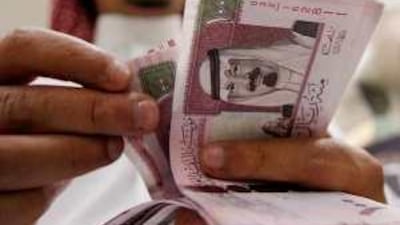Total assets held by the Saudi Central Bank, better known as Sama, jumped more than 8 per cent in July as foreign currency holdings remained stable and deposits in banks abroad climbed.
The central bank's assets stood at 2.01 trillion riyals ($533.3bn) in July after growing by 19.5bn riyals, or 1 per cent month on month, from 1.99tn riyals in June, according to its latest statistical report.
Deposits with banks abroad climbed more than 35 per cent to 331.21bn riyals, from 244.3bn riyals at the end of July 2021. However, they fell about 2 per cent on a monthly basis, from 338.14bn riyals in June, data showed.
Sama’s investments in foreign securities fell slightly to 1.12tn riyals in July, from 1.13tn riyals a month earlier. Its holdings in bullion and cash remained steady at 1.62bn riyals and 36.43bn riyals, respectively, in July.
Foreign currency holdings remained steady at 265.6bn riyals while the central bank's miscellaneous assets jumped more than 43 per cent to 246.45bn riyals on an annual basis, according to Sama’s statistical report for July.
The total assets of commercial banks in the kingdom grew more than 13 per cent to 3.53tn ($941.3bn) riyals at the end of July.
Their total claims on the private sector stood at 2.21tn riyals while total credit to public sector rose to 604.48bn riyals in the same month.
Saudi Arabia’s banking sector has made a strong rebound from the coronavirus-induced slowdown. The profitability of banks has improved significantly amid the economic recovery, driven by higher oil prices and continued growth momentum in the kingdoms non-oil economy.
The country's economy is set to grow at the quickest pace in a decade and could be one of the fastest-growing this year, according to the International Monetary Fund.
Gross domestic product is forecast to expand by 7.6 per cent this year, after a growth of 3.2 per cent in 2021, the fund said in its World Economic Outlook update in July.
Non-oil growth will increase to 4.2 per cent in 2022, before returning to its medium-term potential of 4 per cent.
The Saudi economy, the largest in the Arab world, grew 11.8 per cent in the second quarter of 2022, with oil-related economic activity rising 23.1 per cent annually.
Non-oil economic activity climbed 5.4 per cent during the period, according to government data released in July.
Credit extended by banks to public sector enterprises — including loans, advances and overdrafts — climbed to 111.07bn riyals at the end of July, from 88.43bn riyals a year earlier.
The total holdings of lenders in government and quasi-government bonds, including international conventional and Sharia-compliant bonds bought by banks from the secondary market, rose to 493.41bn riyals in July, up from 454.58bn riyals in the same month in 2021.
The central bank said total property loans by banks at the end of the second quarter of this year rose more than 77 per cent on an annual basis to 638.27bn riyals.
Property loans to retail clients almost doubled during the April-June period to 503.23bn riyals, while credit to corporate real estate clients stood at 135.04bn riyals, up from 109.62bn riyals from a year earlier, according to Sama's data.


